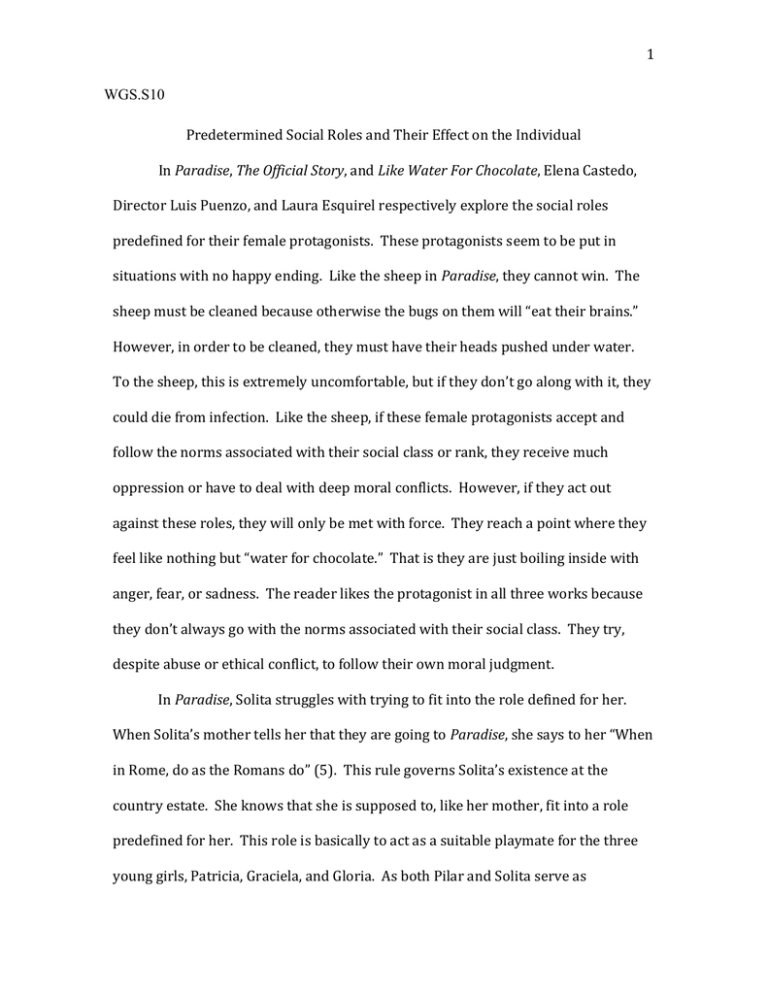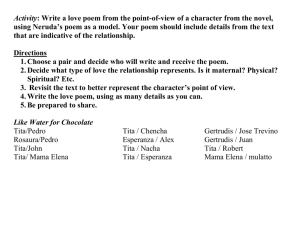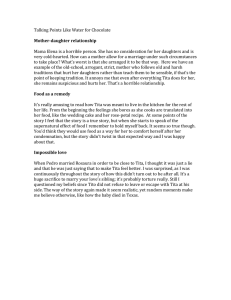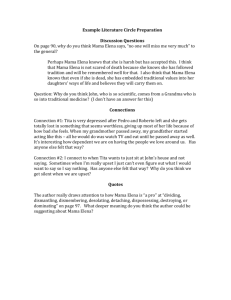1 WGS.S10 Predetermined Social Roles and Their Effect on the Individual
advertisement

1 WGS.S10 Predetermined Social Roles and Their Effect on the Individual In Paradise, The Official Story, and Like Water For Chocolate, Elena Castedo, Director Luis Puenzo, and Laura Esquirel respectively explore the social roles predefined for their female protagonists. These protagonists seem to be put in situations with no happy ending. Like the sheep in Paradise, they cannot win. The sheep must be cleaned because otherwise the bugs on them will “eat their brains.” However, in order to be cleaned, they must have their heads pushed under water. To the sheep, this is extremely uncomfortable, but if they don’t go along with it, they could die from infection. Like the sheep, if these female protagonists accept and follow the norms associated with their social class or rank, they receive much oppression or have to deal with deep moral conflicts. However, if they act out against these roles, they will only be met with force. They reach a point where they feel like nothing but “water for chocolate.” That is they are just boiling inside with anger, fear, or sadness. The reader likes the protagonist in all three works because they don’t always go with the norms associated with their social class. They try, despite abuse or ethical conflict, to follow their own moral judgment. In Paradise, Solita struggles with trying to fit into the role defined for her. When Solita’s mother tells her that they are going to Paradise, she says to her “When in Rome, do as the Romans do” (5). This rule governs Solita’s existence at the country estate. She knows that she is supposed to, like her mother, fit into a role predefined for her. This role is basically to act as a suitable playmate for the three young girls, Patricia, Graciela, and Gloria. As both Pilar and Solita serve as 2 companions for Tia Merce and the three girls, they are forced into positions where they really can’t win. At El Topaz, the class hierarchy is pretty well defined. At the top, there is Tia Merce because it is her estate. Below her are all of her distinguished guests and relatives. One could argue that as time progresses, Pilar becomes a part of this group, because she is somewhat of a favorite of Tia Merce. According to the girls, however, Pilar and her children are below this group on the social hierarchy because they are not distinguished or rich, with the “peones” below them. In many Latin American cultures, lighter skin is idealized because of a Eurocentric ideology commonly found. Pilar and Solita do have lighter skin because they are Spanish, but the girls argue that they are from a higher class because they are descendents of the counts and royalty of Spain who immigrated to America, whereas Solita is a commoner and a refugee. Of course, this doesn’t really make much sense; the rich would have stayed where they were comfortable in Spain, while those seeking new opportunity would have gone to the New World. Regardless, the girls see Solita as lower class because she is not of the bourgeoisie and because her family has less money than theirs. When describing this hierarchy, Solita says “Everyone in El Topaz was trapped below or above somebody, with Tia Merce way up there at the very top” (192). She uses the word “trapped” because at El Topaz, you are defined by your social rank. Solita is a suitable playmate for the girls because she is of a lower status on the estate and can thus be used and abused. Solita’s foil ball, for example meant a great deal to her. The girls want to use the foils to pick up dog feces so they can 3 “scatter these poops around the grown‐ups [they] don’t like” (90). When Solita refuses to give them the foil ball that was so important to her grabbed her and tore it out of her hands, ruining it. The girls have no respect for Solita because she is there for them. The girls then say, “See what you’ve done, Solita. Half our supplies lost, after we waited forever. You’ve ruined a masterful plan” (91). They don’t even care that they ruined one of her most prized possessions. In order to “survive” on the estate, Solita learned that “you had to stand and act as if you didn’t care” (91) even when you really did, because if she had cared, the situation would have blown up. The girls retaliated for this incident by not letting Solita touch (or even stand on) anything that’s “theirs.” Solita ends up wishing she had just given them her foil ball in the first place to save her the retaliation; it wasn’t worth it. It gets into Solita’s head that the girls were right because she was constantly abused. She starts to believe at this point in the story that it is not worth it to stand up for herself. She is put in a place where it is easier to go along with the girls, even if that means losing things that are important to you. If she had given the girls the foil ball in the first place, she would have saved herself much ridicule. There was no way to win in this situation; the easiest course of action for Solita to take would have been to give into the abuse and disrespect. As time goes by, Solita learns that to survive on the estate, she must really try to be “one of the four.” Psychologically, when one is placed in a position where they are constantly put down, they start to give in. In the Stanford Prison experiment, subjects were given either the role of a guard or a prisoner. The study had to be cut short because the many of the “prisoners” had shown signs of extreme depression. 4 The researcher, Philip Zimbardo wrote, “We had created a dominating behavioral context whose power insidiously frayed at the seeming impervious value of compassion, fair play, and belief in just a word. The situation won, humanity lost” (Zimbardo). In this experiment, the subjects were given ranks, and after only a couple of days, the “guards” who had the authority because of their rank, felt they had the power to ridicule and abuse the “prisoners.” Essentially, Solita enters the estate with a lower status than the girls. Though the divide is not as great as that simulated in the Stanford Prison Experiment, Patricia, Graciela, and Gloria feel that they have power over Solita because she came into the ranch poorer and with less “interesting” parents. In the experiment, the “prisoners” stopped fighting back after a certain point because they had been psychologically conditioned to accept it. Incidents like the foil ball argument caused Solita to accept the fact that the girls had power over her. Near the end of the book, however, we do see that Solita retains some of her own beliefs. Even though she desperately wants to be included in “one of the four” she also wants to have her own life. She wants to retain who she is, but still not have to be ridiculed by the girls. Part of the reason we like Solita is because she doesn’t give in completely. She goes to Mlle. Vicky’s dance class, she goes to see the peasant funeral with Nanny Fresia, and she still has hope that her father and mother will take her back to Galmeda. She doesn’t quite lose who she is, when it would be extremely easy to given the constant psychological abuse she faces. Similar to how Solita cannot win, in The Official Story, the main character, Alicia, cannot win. She struggles with the knowledge that her daughter was taken 5 from her biological mother by force. Alicia is of the upper/middle class in Argentina during the 1970’s when the government used armed forces to dissolve political factions and put everything under government control in order to “restore order and peace in the country” (426). Alicia doesn’t necessarily have an oppressor like Solita, but there is a role that she is expected to have in society, and following the norms of that upper middle class role means that her daughter will never know her biological family, and deviating from it means that her family will be torn apart. There is really no right answer in Alicia’s case. She feels personally compelled to reach out to her daughter’s biological grandmother because if her granddaughter were taken from her daughter, she would want some answer. During the Dirty War (1970s) in Argentina, the military would simply make people “disappear” if they had any suspicions whatsoever. Many of the women who were taken for such unfounded suspicions were pregnant before they were taken, were raped and impregnated after being taken, or had small children before being taken. These children were then “adopted” out to the bourgeoisie of Argentina. The mothers and grandmothers of these children protested, and at first were called crazy, “. . . using the age‐old technique of a dominating male society by calling women regarded as ‘out of their place’ crazy” (433). When Alicia learns that her “adopted” daughter may have been taken from her biological mother by force, she feels horrible and wants to do something. When she confronts her husband, he calls her insane, because she is standing up for what is right, like the mothers. Alicia is of the middle to upper class of people in Argentina because her husband, Roberto, is a wealthy businessman with close connections to the 6 government. While hard to believe, Alicia, like members of the Argentine middle class, are not aware of the “disappearing”, the torture, the rape, the murder, and the mothers whose children were taken away from them. She wasn’t really aware at all of the Dirty War until her students argue that the "government approved" History books given to them were written by the regime's "assassins", and so are biased. Because life is comfortable for Alicia, she never questions anything. She never realizes that people around her are being taken. Even when her close friend “disappears,” she wonders why she didn’t call or anything. It never really crosses her mind that Ana, her friend, was forced out of the country. As astounding as this might seem, this was extremely common in Argentina during the Dirty War. While the upper middle class in most cultures can shape a nation and bring important issues to the forefront of the political scene, the upper middle class in Argentina did exactly the opposite. It was easy for them to ignore everything going on around them. In Alicia’s case, she didn’t even know about it. This is probably somewhat subconscious. When a person doesn’t want to hear about something, they usually wont. The upper middle class was comfortable. Many people, like Alicia and Roberto, had adopted children and didn’t want to ask questions because they just wanted the child. Part of the reason that we like Alicia is because she does ask questions. Her husband gets angry at her, calling her insane for questioning such things, just as the mothers were called insane because they protested against the injustice. When Alicia doesn’t follow her socioeconomic class’s normal attitude toward the war (not to ask questions), she is perceived as rogue. 7 Unfortunately, knowing the truth doesn’t really make anyone’s life better. The audience finally breathes that at least Sara, the possible biological grandmother, may know her granddaughter. However, Gaby, Alicia’s daughter, has a great life with parents that love her. Even Roberto, who we don’t want to like because he chooses to turn the other way to the war, seems to really love his daughter (and his daughter loves him). The horrible realization that her daughter was taken from her biological family by force only creates strife in Alicia’s life. Had she turned the other way, or never become aware of the “disappearing,” her daughter would have grown up in a safe, loving home. However, knowing the truth causes Alicia to seek Gaby’s biological family, starting a fight between Alicia and Roberto. The fate of Gaby is unclear at the end of the movie, but it is sort of a catch twenty‐two in the sense that there is no happy ending. If Gaby stays with Alicia and Roberto, things will never be the same between Alicia and Roberto and Gaby will have never known her true family (who has the right to know her). If she leaves to live with her grandmother, she loses the family she has. Alicia and Roberto are good parents to her, and she would have a good life with them. The best environment for Gaby is probably with Alicia and Roberto. Thus, unfortunately, the course of action that would have lead to the happiest ending would have been if Alicia had never asked questions. The audience, however, wanted Alicia to ask questions because of the injustice of it all. Like Solita, the main character, Tita, in Like Water For Chocolate is oppressed. And similar to Solita and Alicia, she struggles to deviate from some social role defined for her. Tita is not allowed to marry the man she loves because of her lower status in her family. Tita is the youngest daughter, which by Mexican tradition 8 means that she cannot marry so that she can take care of her mother in her old age. Of course, this does mean that since Tita is denied her own husband and children, there will be no one to take care of her in her old age. When her mother, Mama Elena, tells her of this tradition, “Tita lowered her head, and the realization of her fate struck her as forcibly has her tears stuck the table” (Esquirel 11). Though Tita saw her fate more as a doom, “In the De la Garza family, one obeyed—immediately” (Esquirel 12). So, when the love of Tita’s life, Pedro asks for her hand in marriage, Mama Elena offers her older daughter’s hand instead because of this tradition. Pedro accepts Rosaura because he knows that by marrying the older daughter, Rosaura, it will put him in close proximity to Tita. The novel follows Tita’s struggle with being denied love as the youngest daughter. Tita’s lower status in the family comes from not only being the youngest daughter in the family, but also from her mother’s open resentment toward her. Perhaps being a metaphor for the state of the Mexican Revolution going on at the same time, Mama Elena’s enforcement of the tradition grows more intense as the book goes on. Similar to Solita in Paradise, Tita is constantly reminded of her place on the ranch by Mama Elena. For example, when Mama Elena finds Tita visibly upset, without Tita even saying anything, Mama Elena guesses that Tita is upset because she is denied Pedro, and proceeds to give “Tita a tremendous slap that left her rolling in the dirt by the rooster . . .” (Esquirel 27). Like Patricia, Gloria, and Graciela have no respect for Solita, Mama Elena has no respect for Tita, because if she did she would allow her to marry Pedro. Mama Elena was also not allowed to marry the man she loved (because he was “mulatto”). 9 It seems almost criminal to deprive her own daughter of the same thing she was deprived of. Not only is Tita not allowed to marry Pedro, she has to cook for Rosaura and Pedro’s wedding. For Tita, this is understandably torture since she knows that Pedro loves her. By some magic, Tita’s feelings often come out through her food and anyone who eats the food she makes has some empathetic feelings. So everyone who ate Tita’s cake at the wedding feels overcome with longing and sadness. Mama Elena immediately thinks that Tita had “deliberately ruined Rosaura’s wedding by mixing an emetic into the cake” (Esquirel 41), and so beats her worse than ever. It is this type of automatic assumption that leaves Tita helpless. The effect that Tita’s food has on people is her own release of emotion. She cooks to help relieve herself of pain, but unfortunately it leads to Mama Elena causing her even more pain. The magic of the food could be an artistic attempt by Esquirel to show the helplessness of Tita’s situation. This is seen again when Mama Elena becomes suspicious of a lasting connection between Pedro and Tita, she sends Pedro, and their son Roberto to San Antonio on the basis that Rosaura needs medical attention since she cannot breastfeed Roberto. Tita becomes extremely depressed when Pedro and Roberto leave, since they were two of the only things on the ranch that Tita truly loved. Eventually Roberto dies because Rosaura cannot feed him. When Tita lashes out at Mama Elena, Mama Elena hits her in the face. Tita retreats and when she is finally found, she is in a catatonic state. Tita was driven to insanity by the circumstances around her. She, like Solita and Alicia, cannot win. If she does not object to the life that Mama Elena has set forth for her, then she must live with extreme misery, 10 losing the one she loves. If she defends herself, she will only be met with physical and verbal abuse. We like Tita, though, because she never really seems to give up. She lets her rage out through her cooking, and always loves Pedro no matter what. In the end, when they can finally be together, she follows him down a “brilliant tunnel,” and they die together engulfed in their own passion. The reader wants to see Tita with Pedro because they love each other. We want to see Mama Elena allow Tita love, and if we cannot see that, we are almost happy when Mama Elena dies, and when Rosaura dies, because it means that Tita and Pedro can be together. We are happy when Tita succeeds, just as we are happy when Solita gets complimented by Madame for her writing skills while Patricia, Graciela, and Gloria are scolded for their poor writing skills. We are happy when Alicia confronts her husband, because at least she’s not being quiet anymore. We want to see these characters break out of their role. Alicia’s case is somewhat different than Solita’s and Tita’s in the sense that confronting her husband, and deviating from the silence that plagues her class in society doesn’t bring her anything good. For Solita, she gets her own piece of mind when she chooses to have her secret life. For Tita, she can secretly be with Pedro (while he is married to Rosaura), for at least a while, when she disobeys Mama Elena. When Alicia breaks the silence, it only means that she must choose to share her daughter, give her up, or know that she is keeping her daughter from her biological family. Either way, though, we still want her to break the silence; we want her to not turn the other way like her husband, and like so many others of the 11 Argentinean upper middle class during the Dirty War. These authors and director may have wanted to explore the idea of breaking a mold for one’s own moral objectives, which the audience likes, perhaps because people like to root for an underdog. It is clear, also, that they wanted to show that predetermined social roles only lead to helpless situations. Works Cited Agosin, Marjorie, and Cola Franzen. “A Visit to the Mothers of the Plaza de Mayo.” Human Rights Quarterly. 9.3 (1987): 426‐35. Web. 4 May 2010. Castedo, Elena. Paradise. New York: Grove Weidenfeld, 1990. Print. Esquirel, Laura. Like Water For Chocolate. New York: Anchor Books, 1995. Print. 12 The Official Story. Dir. Luis Puenzo. With Hector Alterio, Norma Aleandor, and Chunchuna Villafañe. Historias Cinematographicas Cinemania, 1985. Zimbardo, Philip. “Revisiting the Stanford Prison Experiment: a Lesson in the Power of the Situation.” The Lucifer Effect. Philip G. Zimbardo. 30 March 2007. Web. 5 May 2010. MIT OpenCourseWare http://ocw.mit.edu WGS.S10 Special Topics in Women & Gender Studies Seminar: Latina Women's Voices Spring 2010 For information about citing these materials or our Terms of Use, visit: http://ocw.mit.edu/terms.





